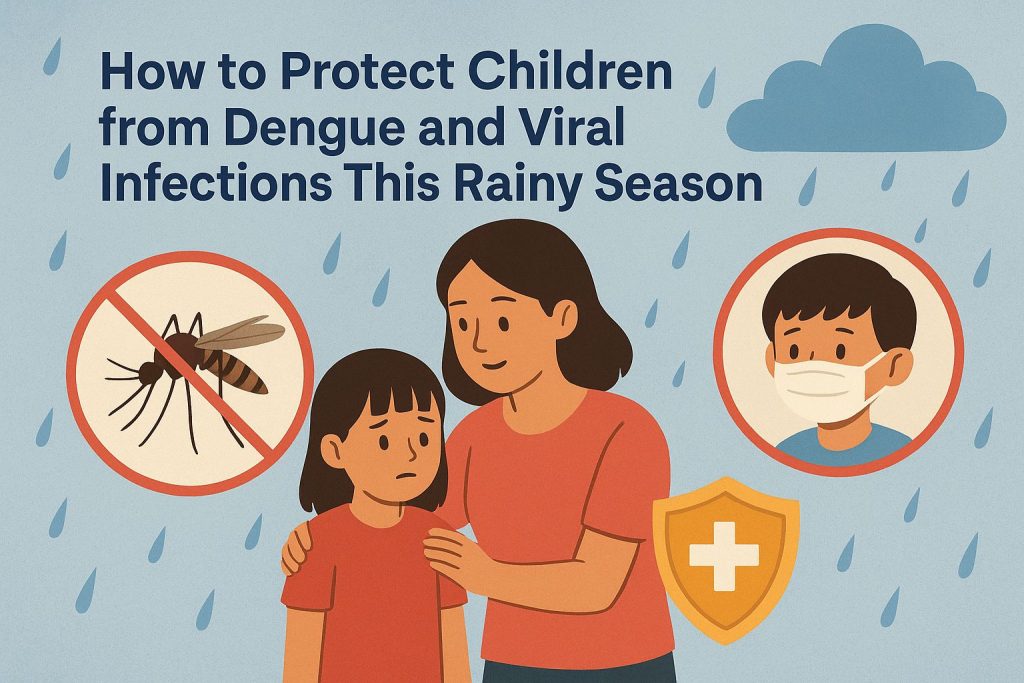How to Protect Children from Dengue and Viral Infections This Rainy Season

The rainy season in Delhi brings with it the risk of several viral infections, including the dreaded dengue fever. As a parent, it’s natural to be concerned about your child’s health during this time of the year. In this blog post, we’ll explore practical tips to protect your little ones from dengue and other viral illnesses this monsoon.
Understanding the Risks of Dengue
Dengue is a mosquito-borne viral infection that can cause a range of symptoms, from mild fever to severe complications. Children are particularly vulnerable to the disease, as their immune systems are still developing. Symptoms of dengue in children may include high fever, severe headache, body aches, nausea, and a characteristic skin rash.
In severe cases, dengue can lead to complications such as bleeding, organ impairment, and even life-threatening conditions like dengue shock syndrome. The risk of these complications is higher in children, making it crucial to take preventive measures.
Implementing Preventive Measures
The key to protecting your child from dengue and other viral infections is to take proactive steps. Here are some effective strategies:
- Mosquito Control: Ensuring your home is free of stagnant water is the first line of defense against mosquitoes. Regularly check for and eliminate any potential breeding grounds, such as flower pots, clogged gutters, and discarded tires. Use mosquito repellents, both on your child’s skin and in the environment, to deter mosquitoes from entering your home. Consider installing window screens and using mosquito nets for your child’s bed to create a physical barrier against these pesky insects.
- Strengthening Immunity: A robust immune system is crucial in helping your child’s body fight off viral infections. Provide a nutritious diet rich in vitamins, minerals, and antioxidants to support their overall health. Encourage your child to stay hydrated by offering plenty of water, juices, and healthy fluids. Adequate rest is also essential, as sleep plays a vital role in immune function.
- Regular Health Checkups: Schedule regular visits with your pediatrician to monitor your child’s health and catch any potential infections early on. During these checkups, your doctor can assess your child’s growth, development, and overall well-being, and provide personalized recommendations for maintaining good health.
- Prompt Treatment: If your child does develop symptoms of dengue or any other viral illness, seek medical attention immediately. Early diagnosis and appropriate treatment can significantly improve the outcome. Be on the lookout for warning signs such as severe abdominal pain, persistent vomiting, rapid breathing, and unusual bleeding or bruising, as these may indicate the need for urgent medical care.
Preparing for Emergencies
Despite your best efforts, there’s always a chance your child may contract a viral infection. Be prepared by familiarizing yourself with the warning signs of dengue and other serious illnesses. Know the nearest medical facilities that specialize in pediatric care, and have their contact information readily available.
In the event of a suspected dengue case, it’s crucial to monitor your child’s vital signs and seek medical assistance promptly. Your child’s doctor may recommend laboratory tests to confirm the diagnosis and determine the severity of the illness. Depending on the case, treatment may involve fluid management, medication, and close monitoring to prevent complications.
Staying Informed and Vigilant
Staying informed about the latest developments and precautions related to viral infections is crucial for protecting your child’s health. Follow reputable sources, such as the World Health Organization (WHO) and the Centers for Disease Control and Prevention (CDC), for up-to-date information on disease outbreaks, prevention strategies, and recommended treatments.
It’s also important to educate your child about the importance of good hygiene practices, such as regular handwashing, covering coughs and sneezes, and avoiding close contact with sick individuals. Encourage your child to be proactive in maintaining their health and reporting any concerning symptoms to you or their healthcare provider.
Remember, prevention is the best strategy when it comes to protecting your child’s health during the rainy season. By taking proactive steps and staying vigilant, you can help ensure your little one stays safe and healthy this monsoon.



